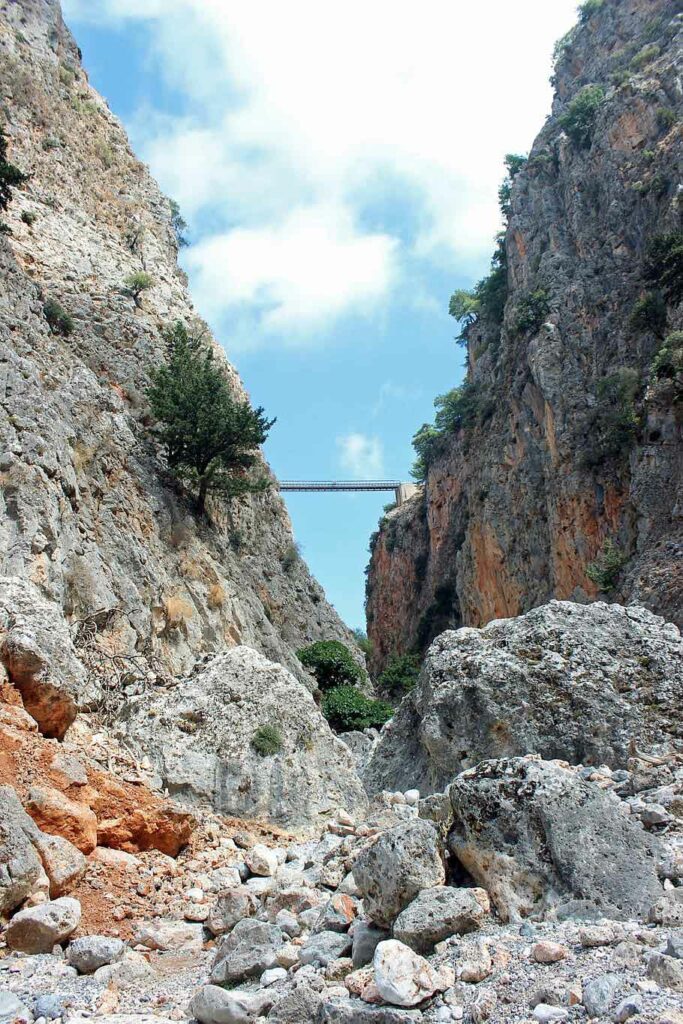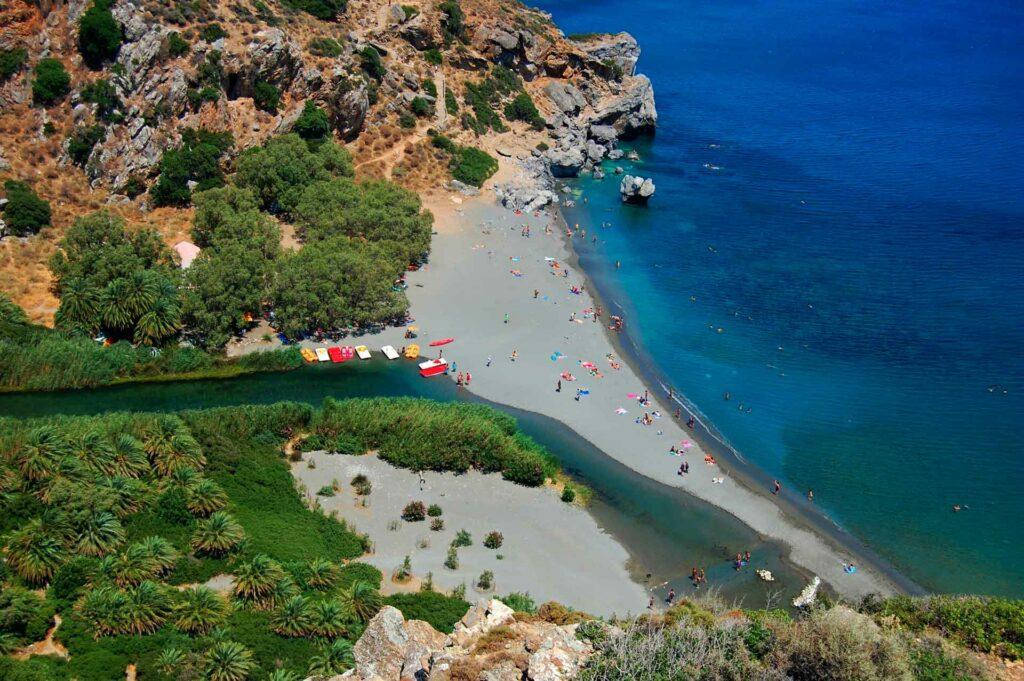
Crete and mythology
Ariadne's thread Daedalus and Icarus Europe
… (La Crète et sa mythologie). Un terrible malheur s’était abattu sur la cité d’Athènes. Androgée, fils unique de Minos, le puissant Roi de Crète, perdit la vie au cours d’une visite qu’il faisait au Roi athénien Egée. Celui-ci, au mépris de toutes traditions, avait envoyé son hôte dans une expédition pleine de périls – il s’agissait de tuer un taureau redoutable.
Ce fut le taureau qui tua l’adolescent et Minos, en représailles, envahit le pays, prit Athènes et déclara qu’il raserait la ville jusqu’au sol à moins que les Athéniens ne s’engagent à lui livrer tous les neuf ans un tribut de sept jeunes gens et autant de jeunes filles. Un sort affreux attendait ces malheureux. Dès leur arrivée en Crète, ils étaient donnés en pâture au Minotaure.
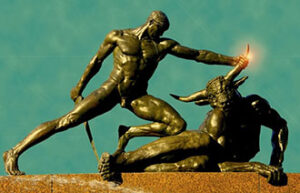
It was a half-bull, half-man monster, the offspring of Minos' wife Pasiphae and a bull of marvellous beauty. Poseidon had once given this bull to Minos to offer him as a holocaust, but Minos could not decide to sacrifice it and kept it for himself. As a punishment, Poseidon made Pasiphae fall in love with the beast.
Quand naquit le Minotaure, Minos ne le tua pas. Il ordonna à Dédale, le grand architecte et inventeur, d’édifier un lieu de réclusion d’où il serait impossible de s’enfuir, et Dédale construisit le Labyrinthe, devenu fameux dans le monde entier. Une fois entré dans cet enchevêtrement de méandres, on n’en pouvait sortir.
C’est là qu’étaient menés les jeunes Athéniens destinés à devenir les victimes du Minotaure. Ils n’avaient aucun moyen de lui échapper car s’ils couraient, ils risquaient de rencontrer le monstre à chaque détour de l’enclos comme il pouvait surgir à tout moment s’ils restaient immobiles. Tel était le destin funeste promis aux quatorze jeunes Athéniens et Athéniennes quelques jours après l’arrivée de Thésée dans la cité. L’heure avait sonné d’une nouvelle livraison du tribut.
Theseus, son of King Aegeus, immediately came forward and offered to be among the victims. Everyone appreciated his generosity and admired his greatness of spirit, but no one suspected that he intended to kill the Minotaur. However, he confided his intention to his father and promised that if he succeeded, he would change the black sail that was always hoisted on the ship carrying the lamentable cargo into a white one, so that Aegeus would know long before he touched land that his son was coming back to him safe and sound.
When they landed in Crete and before being led to the Labyrinth, the young Athenians had to parade before the islanders. Ariadne, the daughter of Minos, was among the spectators; she saw Theseus passing by and was infatuated at first sight.
Comme un chêne tombe sur la colline. Elle fit venir Dédale et lui demanda de lui indiquer un moyen de sortir du Labyrinthe ; puis elle envoya chercher Thésée ; elle lui dit qu’elle assurerait sa fuite à la condition qu’il lui promette de l’emmener avec lui à Athènes pour l’épouser. On se doute qu’il ne fit aucune difficulté pour y consentir ; alors elle lui donna ce qu’elle avait reçu de Dédale, un peloton de fil qu’il devait attacher par une extrémité à l’intérieur de la porte et dérouler au fur et à mesure de son avance. Ce qu’il fit, et désormais assuré de pouvoir retourner sur ses pas, il partit hardiment à la recherche du Minotaure.
Le monstre dormait quand il le trouva ; Thésée s’élança l’épée levée et le cloua au sol ; alors, avec ses poings – il n’avait plus d’autre arme – il martela la bête à mort :
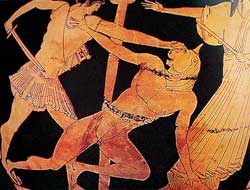
Ecrasant tout sous son poids
So did Theseus. He expressed life
Of the savage brute and now she's dead.
Only the head still moves but the horns are useless.
When Theseus stood up after this terrifying fight, the wire pack was still where he had dropped it - he had only to make his way out. The others followed, and taking Ariadne with them, they ran to the ship that returned to Athens after crossing the sea.
On the way, they landed on the island of Naxos and what happened there is related with some variations. One account says that Theseus left Ariadne there. She was asleep and he took advantage of this to set sail again, without her. Dionysus then met her and consoled her. The other version is much more favourable to Theseus. Ariadne was suffering from a violent seasickness, so the hero had her put ashore for a short rest while he himself went back on board to attend to some urgent task. A stormy wind blew the ship out to sea and kept her there for a long time. On his return, the hero learned that Ariadne had died and was greatly distressed.
Both versions agree that he forgot to hoist the white sail as he approached Athens; perhaps his joy at the success of his voyage had driven all other thoughts from his mind, or perhaps his grief at losing Ariadne.
However, the black sail remained attached to the mast, and from the Acropolis, where he had been staring at the sea for days, his father saw it. For him it was the sign of his son's death; from the top of a rock he plunged into the sea and died. And since then the sea into which he fell has been named after him, Aegean.
Theseus thus became King of Athens, and a wise and selfless ruler if ever there was one.
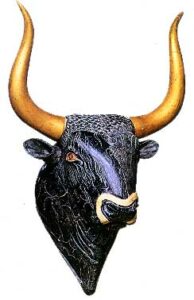
He immediately declared that he had no desire to rule, but wanted a government of the people by the people, where all would be equal. He therefore renounced royal power and established the republic; he had a council hall built where all citizens would meet and vote.
Il ne garda pour lui-même que la charge de Commandant en Chef. Et ainsi Athènes devint de toutes les cités du monde la plus heureuse et la plus prospère, l’unique foyer d’une réelle liberté, le seul endroit sur la terre où les hommes se gouvernaient eux-mêmes.
Et ce fut pour cette raison que pendant la grande Guerre des Sept contre Thèbes, quand les Thébains victorieux refusèrent la sépulture à ceux de leurs ennemis qui avaient succombé, les vaincus se tournèrent vers Thésée et Athènes, persuadés que des hommes libres conduits par un tel homme ne consentiraient jamais à une telle injustice envers les morts.
Leur prière ne fut pas vaine. Thésée mena son armée contre Thèbes, conquit la cité et l’obligea à accorder la sépulture aux morts. Mais le héros triomphant refusa de rendre aux Thébains le mal pour le mal et se conduisit en parfait chevalier.
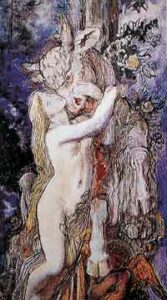
He forbade his soldiers to enter the city and plunder it; he had not come to punish the Thebans but to bury the dead Argives, and when his duty was done he led his army back to Athens.
He shows the same qualities in many other stories.
He welcomed the ageing Odipus whom everyone had rejected; he stayed by his side when he died, supporting and comforting him. He protected the two helpless daughters of the same Oedipus and on the death of their father sent them safely home. When, in a fit of madness, Heracles killed his wife and children and then wanted to kill himself when he came to his senses, Theseus alone remained with him. Fearing that they would be contaminated by the presence of a man guilty of such a crime, all the other friends of Heracles had fled, but Theseus reached out to him, raised his courage, made him understand that to kill himself would be cowardice, and finally took him back with him to Athens.He welcomed the ageing Odipus whom everyone had rejected; he stayed by his side when he died, supporting and comforting him. He protected the two helpless daughters of the same Oedipus and on the death of their father sent them safely home. When, in a fit of madness, Heracles killed his wife and children and then wanted to kill himself when he came to his senses, Theseus alone remained with him. Fearing that they would be contaminated by the presence of a man guilty of such a crime, all the other friends of Heracles had fled, but Theseus reached out to him, raised his courage, made him understand that to kill himself would be cowardice, and finally took him back with him to Athens.
Yet all the duties of state and all the exploits required of a knight-errant to defend the weak and oppressed were not enough to curb Theseus' passion for the danger itself. He went to the land of these warrior women, the Amazons, - some say with Heracles, others, alone - and kidnapped their Queen, sometimes named Antiope and sometimes Hippolyta. It is certain that the son she gave to Theseus was called Hippolytus and that after his birth the Amazons invaded Attica, the country surrounding Athens, and even managed to penetrate the city. They were finally defeated and as long as Theseus lived, no other enemy ever entered Athens again.
Il eut bien d’autres aventures. Il fut de ceux qui s’embarquèrent sur l’Argo et partirent à la Conquête de la Toison d’Or. Il prit part à la grande Chasse Calydonienne, quand le Roi de Calydon fit appel aux princes les plus nobles de la Grèce pour l’aider à exterminer le terrible sanglier qui ravageait son pays. Ce fut alors que Thésée sauva la vie de Pirithoüs, son téméraire et impétueux ami, comme il devait encore le faire bien souvent par la suite. Si Pirithoüs était tout aussi aventureux que Thésée, il ne remportait certes pas les mêmes succès et se trouvait ainsi perpétuellement en difficulté. Thésée, qui lui était fort attaché, l’aidait chaque fois à se tirer d’affaire. (La Crète et sa mythologie). Voir nos pages Top 10 in Crete and the Knossos museum
"Mythology: Timeless Tales of Gods and Heroes"
Edith Hamilton
Daedalus and Icarus
… (La Crète et sa mythologie). Dédale était cet architecte qui construisit, en Crète, le Labyrinthe pour le Minotaure et qui montra à Ariane comment Thésée pourrait en sortir. En apprenant que les Athéniens avaient trouvé le moyen de s’en échapper, le roi Minos fut aussitôt convaincu qu’ils n’auraient pu y réussir sans l’aide de Dédale.
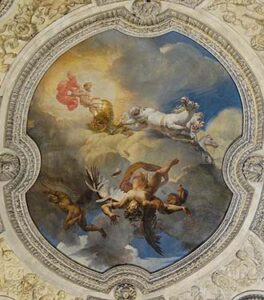
Consequently, he imprisoned the architect and his son in this same labyrinth, which would tend to prove the excellence of the plan of this enclosure, since without any indication, even its author could not discover the exit. But the great inventor was not bothered for so little. He said to his son:
Leakage may be impeded by land and water
But the air and sky are free.
et il fabriqua deux paires d’ailes, qu’il fixa avec de la cire à ses épaules et à celles de son fils Icare. Avant de prendre leur envol, Dédale recommanda à Icare de ne pas s’élever trop haut sur la mer, car, dit-il, en approchant de trop près le soleil, la cire pourrait fondre et les ailes se détacheraient. Mais comme tant d’histoires nous le montrent, la jeunesse ne tient guère compte de ce que disent les aînés. Tous deux s’élevèrent donc, légèrement et sans effort, et quittèrent la Crète ;
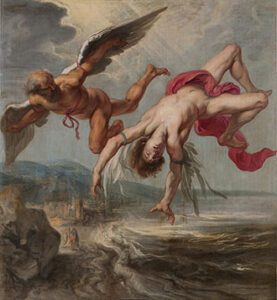
le ravissement de ce nouveau et merveilleux pouvoir grisa l’adolescent. Il monta de plus en plus haut, refusant d’entendre les appels angoissés de son père. Et ses ailes se détachèrent. Il tomba dans la mer et les eaux se refermèrent sur lui. Ainsi Icare donna son nom à l’île proche et à la mer qui l’entoure.
Le père affligé poursuivit sa route sans accident et atterrit en Sicile où il fut fort bien accueilli par le roi Cocalos.
Rendu furieux par cette fuite, Minos décida de retrouver Dédale. Pour y parvenir, il employa la ruse. Il fit proclamer partout qu’il accorderait une grande récompense à quiconque réussirait à passer un fil dans les volutes d’une coquille aux spirales particulièrement enchevêtrées. Dédale déclara au Roi de Sicile qu’il se faisait fort d’y parvenir. Il perça d’un petit trou l’extrémité de la coquille, fixa un fil à la patte d’une fourmi, introduisit la fourmi dans l’orifice, qu’il boucha. Quand la fourmi sortit enfin par l’autre extrémité de la coquille, le fil, bien entendu, l’avait suivie dans tous ses tours et détours. « Only Daedalus could imagine
such a scheme "Minos said, and set off for Sicily to seize the architect. But King Cocalos refused to hand him over and in the ensuing struggle Minos was killed. (La Crète et sa mythologie)
"Mythology: Timeless Tales of Gods and Heroes"
Edith Hamilton
L'Europe
… (La Crète et sa mythologie). Io ne fut pas la seule jeune fille qui dut à l’amour de Zeus d’accéder à une renommée géographique. Il y en eut une autre, beaucoup plus connue – Europe, fille du Roi de Sidon. Mais alors que l’infortunée lo paya fort cher d’être ainsi distinguée, Europe au contraire s’en trouva fort bien. Sauf pour les quelques instants de terreur qu’elle éprouva à se trouver traversant la mer sur le dos d’un taureau, elle ne souffrit jamais.
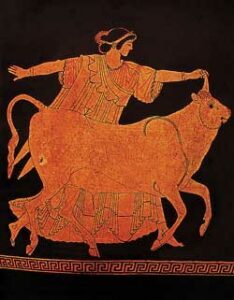
L’histoire ne dit pas à quoi s’occupait Héra dans le même temps, mais il est clair que sa vigilance était singulièrement endormie et son mari, en conséquence, libre d’agir à sa fantaisie.
Par une belle matinée printanière et tandis que du haut des cieux il observait nonchalamment la terre, Zeus aperçut soudain un spectacle charmant. Europe s’était ce jour-là réveillée fort tôt, troublée comme lo l’avait été avant elle par un rêve ; seulement, il ne s’agissait pas cette fois d’un dieu qui serait devenu amoureux d’elle mais de deux continents dont chacun, sous la forme d’une femme, tentait de la posséder, l’Asie prétendant avoir droit de propriété puisqu’elle lui avait donné naissance, et l’autre – sans nom encore – déclarant que Zeus lui donnerait l’adolescente.
Libérée du sommeil en même temps que de cette étrange vision qui lui était venue à l’aube – moment où le plus souvent les vrais rêves viennent aux mortels – Europe décida de ne pas se rendormir mais d’appeler ses compagnes, toutes nées la même année qu’elle et toutes de noble origine, et de leur proposer une escapade dans les prés fleuris en bordure de la mer. C’était leur lieu de réunion favori, soit pour y danser, soit pour s’y baigner, ou encore pour y cueillir des fleurs.
Cette fois, sachant que les fleurs avaient atteint le moment de leur perfection, toutes se munirent de paniers. Celui d’Europe était en or délicatement ciselé de silhouettes qui racontaient – le fait est à souligner – l’histoire dio, ses voyages sous la forme d’une vache, la mort d’Argus, et enfin Zeus la touchant légèrement de sa main et lui rendant sa forme humaine. C’était, on s’en doute, une merveille digne d’admiration et l’ouvre d’un personnage qui n’était rien moins qu’Héphaïstos, le céleste ouvrier de l’Olympe.
Si le panier était charmant, les fleurs destinées à le remplir ne l’étaient pas moins, narcisses odorants, jacinthes, violettes et crocus jaunes, et par-dessus tout la splendeur cramoisie de la rosé sauvage. Enchantées, les fillettes pour suivaient leur cueillette, passant d’une prairie dans l’autre. Elles étaient toutes ravissantes mais Europe brillait parmi elles comme la déesse de l’Amour dépasse les Grâces en éclat. Et ce fut précisément cette déesse de l’Amour qui provoqua ce qui allait ensuite se passer.
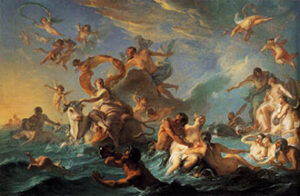
Because, I am sure, it could carry us all;Tandis qu’accoudé aux célestes balcons, Zeus observait ce joli spectacle, celle qui seule avait le pouvoir de subjuguer le dieu – seule, mais avec le concours de son fils, le malicieux Cupidon – celle-là, donc, prit son arc et d’une flèche perça le cour de Zeus qui à l’instant même s’éprit d’un fol amour pour Europe. Bien qu’Héra fût pour l’instant absente, il pensa qu’il valait mieux montrer quelque prudence, aussi jugea-t-il plus sage de se changer en taureau pour paraître devant Europe. Non de ces taureaux que l’on voit dans une étable ou paissant dans un pré mais un taureau superbe, comme on n’en avait jamais vu et comme on n’en verra jamais plus, avec une robe couleur de châtaigne, un front marqué d’un disque d’argent et surmonté d’une corne en croissant de lune.
Il semblait si doux que les jeunes filles ne s’effrayèrent pas de le voir approcher ; elles l’entourèrent et le caressèrent à l’envi, respirant avec délices le parfum qui venait de lui, un parfum plus odorant encore que celui des fleurs de la prairie. Ce fut vers Europe qu’il se tourna et tandis qu’elle le flattait gentiment de la main, il meugla si harmonieusement que même une flûte n’eût pu rendre un son plus mélodieux.
Alors il se coucha à ses pieds, semblant lui offrir son large dos, et elle cria aux autres de la rejoindre et de le monter avec elle,
And he seems so sweet, so nice to see,
He looks more like a man than a bull
Except that he doesn't talk.
Elle s’assit en souriant sur le vaste dos, mais les autres, toutes vives qu’elles fussent, n’eurent pas le temps de l’imiter. Le taureau fit un bond et s’en fut à toute allure vers la mer, puis, non dedans mais au-dessus de la grande étendue d’eau. Et tandis qu’il les foulait, les vagues se calmaient sous lui, et toute une procession surgit des profondeurs et le suivit – les étranges divinités marines, Néréides chevauchant des dauphins. Tritons soufflant dans des conques, et le puissant Seigneur de la Mer lui-même, le propre frère de Zeus.
Effrayée tout autant par ces étonnantes créatures que par les eaux mouvantes qui l’entouraient de toutes parts, Europe se retenait d’une main à la corne du taureau et de l’autre relevait sa robe pourpre pour éviter de la mouiller, et les vents :
Swelling the folds like a sail
Swell on a boat, and gently
They made it sail.
It cannot be a bull, but certainly a god, thought Europa; and she implored him to have pity on her and not to abandon her, alone, in some foreign land. He replied, showing that she had guessed what he really was. He told her not to be frightened. He was Zeus, the greatest of all the gods, and everything he was doing right now was inspired by his love for her. He was taking her to Crete, his island, where his mother had hidden him from birth to keep him from Cronos, his father, and there she would give him :
Glorious sons whose sceptres would exercise their power
On all the men of the earth.
Of course, everything happened as Zeus had said. Crete was soon in sight; they landed and the Seasons, guardians of the gates of Olympus, decked the girl for her wedding. Her sons were famous not only in this world but in the next - where two of them, Minos and Rhadamanthus, became judges of the dead, as a reward for the justice they had shown on earth. But it is the name of Europa that remains forever best known. (La Crète et sa mythologie)
"Mythology: Timeless Tales of Gods and Heroes"
Edith Hamilton
Rent a car in Greece: Crete (Heraklion, Chania, Rethymnon, Agios Nikolaos) – Athens – Rhodes – Corfu – Mykonos – Santorini – Thessaloniki – Preveza/Aktion/Lefkada – Patras/Araxos – Kalamata – Paros – Syros – Kos – Naxos – Lesbos – Thassos – Zakynthos/Zante

